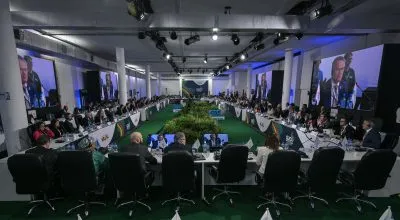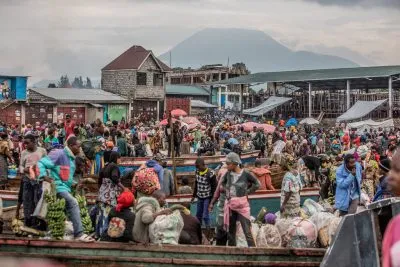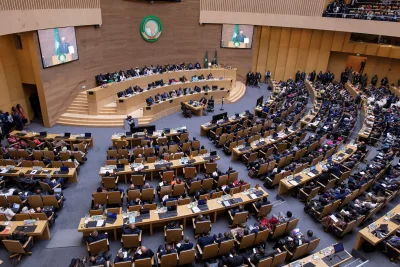The cancellation of Thomas Cook flights to The Gambia has dealt a blow to the country’s second largest economic sector. Will McBain reports on how the country is adapting to the crisis.
When the rains were late this July, Gambians offered up prayers in the country’s mosques and churches for the troubled agricultural sector. Torrential downpours ensued, but they were followed by dark clouds shadowing the second pillar of the Gambian economy – tourism. The news of UK travel company Thomas Cook’s bankruptcy and its immediate cancellation of all flights to the West African nation was met with disbelief by hoteliers, taxi drivers and workers connected with the winter holiday season, which boosts incomes from November to March.
A government spokesperson said in a statement that Thomas Cook flew in 45% of holidaymakers during the season, in an industry accounting for more than 20% of the nation’s GDP of $1.6 billion. Now many businesses are wondering how they will make ends meet, with 35% of workers in the tourism sector at threat of losing their jobs, according to Bunama Njie, chairman of the Gambia Hotel Association (GHA).
The government has responded by forming a strategic response unit with local stakeholders, and teams from the World Bank, the IMF, and the European Union, in an attempt to mitigate the reverberations from Thomas Cook’s collapse. The meetings are an acknowledgment that the debt-burdened economy will take a hit from the expected drop in tourist numbers this next financial quarter, but also that the government wants to address the lack of diversification in the fragile economy.
Volatile industry
“Tourism is very volatile. Thomas Cook, who is thousands of miles away, a foreign investor, whose head office doesn’t even domicile in The Gambia… [the] business now affects our economy more than the Gambian businesses in our country,” said Abdoulie Hydara, director general of the Gambia Tourism Board (GTB), to an assembled group of reporters.
Hydara said that it was time for the country to think about setting up a national carrier: “That is our sustainable tourism method. By having a national carrier, whether it’s regional or goes beyond, it will support our tourism arrivals, it will support our airport landings, it will support all the value chain that is tied to tourism and beyond.”
While the bulk of tourists come from the UK (30%), large numbers of tourists arrive each year from the Netherlands, Sweden, Germany and Nigeria. After a fall in numbers following an annulled election in December 2016, mass protests, and a transition from the dictatorship of Yahya Jammeh, the number of tourists rebounded and reached a record high in 2018, increasing by 26% compared to 2017, according to the World Bank. Over 209,000 people visited Africa’s smallest nation on the continental mainland last year, which has a population of 2.1m.
“The Smiling Coast”, as The Gambia is affectionately known, has built a reputation for pristine sandy beaches, a welcoming population, and a thriving music and nightlife scene. Less than a six-hour flight from London, Brits and Gambian expats could purchase direct, return flights for around £250 with Thomas Cook. The best options for December are now nearly double that, with at least one connection, which is already producing a knock-on effect on flight and hotel bookings.
Gambia Tours provides package holidays, including excursions popular with tourists, but has experienced a decline in bookings in October. “Central Europe and the UK is off,” said managing director Charbel Hobeika. “Of course the UK was a very big market for The Gambia. But we’re talking to another UK tour operator to see if they can start in December, and that will help close the gap we lost with Thomas Cook.”
Permanent staff at his company will keep their jobs, but the outlook for seasonal workers is unclear. “It will hurt for a short time, for sure, but we still have a market from Scandinavia and the rest of northern Europe so we remain hopeful.”
The government continues to try and persuade airlines already flying into The Gambia to schedule more flights during the approaching season – Portugal’s TAP Air has increased to three flights per-week – and negotiate with potential new charter airlines to replace Thomas Cook. Representatives of the government and the private sector flew to the US in a bid to woo new business in October.
“We’re seeing whether we can have air access in terms of an airline that wants to use The Gambia and also get an airport landing arrangement. We’re looking at cities on the East Coast,” said economist Nyang Njie.
With the country at an economic crossroads, “Little Jamaica”, as The Gambia is known thanks to a love of reggae music – is looking to the island nation for inspiration. Jamaica was once reliant on tour operators before diversifying.
“Short term there will be disruptions in the economy but at the public policy level, The Gambia must try and make sure that our tourism portfolio is vertically integrated, meaning we go to the source market, get our own clientelle, and bring them. We cannot rely on someone else to put butter on our bread. We should start creating that butter so we can start spreading it evenly on our own bread,” said Njie.
The Gambia remains a net importer with poor infrastructure, a dilapidated port and recurrent electricity shortages. During Jammeh’s misrule the nation saw its competitive advantage shrink in comparison with neighbouring Senegal. The groundnut exports that were once used in the chocolates made by major world brands are at the mercy of climate change and irregular rain patterns.
Containers often sit at port for weeks, causing the shortening of menus in restaurants and goods on the shelves. President Adama Barrow’s administration is aiming to increase efficiency and investment to streamline imports, and implement a new agricultural policy. Yet some citizens fear that Barrow, once the country’s hope for democratic change, is planning to remain in power beyond a promised three-year transition period.
Despite these problems, growth in the digital economy and telecommunication sector is promising –telecoms firms Africell, Qcell and Gamtel are the highest tax contributors in the economy.
Businesses need support
But in the short term, local businesses need to be supported following their deep investments in tourism, having readied themselves for an influx that is unlikely to arrive. Tax breaks or tax postponements are being mooted, according to Njie, to ensure businesses experience a soft landing this fiscal year. However, the debt-stressed nation may need to rely on international donor support as it goes forward.
“If they [tourists] don’t come it could be very bad” said local taxi driver Jack Sallah. “There’s big money going on bridges and roads but we can’t put concrete on dinner plates, so we have to trust the government to do what they can to bring tourists here,” he said.
Want to continue reading? Subscribe today.
You've read all your free articles for this month! Subscribe now to enjoy full access to our content.
Digital Monthly
£8.00 / month
Receive full unlimited access to our articles, opinions, podcasts and more.
Digital Yearly
£70.00 / year
Our best value offer - save £26 and gain access to all of our digital content for an entire year!
 Sign in with Google
Sign in with Google 



